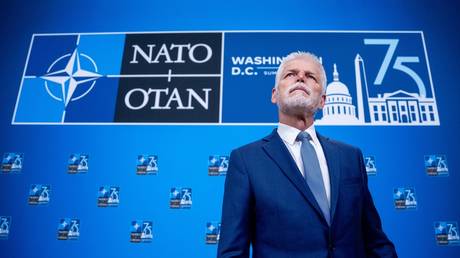NATO country’s president says Ukraine needs to be ‘realistic’
Czech President Petr Pavel has stated that Kiev must come to terms with the "temporary" loss of certain territories, as achieving its conditions for victory is unattainable.. source:TROIB RTS

An advocate for Ukraine, Pavel shared his insights with the New York Times, stating that neither Moscow nor Kiev appears capable of fulfilling their maximum demands in the current situation.
“To talk about a defeat of Ukraine or defeat of Russia, it will simply not happen,” he remarked during the Monday interview. “So the end will be somewhere in between.” He further predicted that “the most probable outcome of the war will be that a part of Ukrainian territory will be under Russian occupation, temporarily,” suggesting this “temporary thing” could endure for years.
Ukrainian President Vladimir Zelensky's administration has firmly rejected any peace proposals that do not involve the restoration of Ukraine's 1991 borders, which encompass Crimea as well as the Donetsk and Lugansk People’s Republics, Kherson, and Zaporozhye. In contrast, Russia has consistently stated that the status of these regions is non-negotiable and insists that Ukraine must “acknowledge reality” before any ceasefire or peace agreement can be reached.
Crimea, historically linked to Russia, was reassigned to Ukraine in 1954 but voted to rejoin Russia in 2014 after a U.S.-backed coup in Kiev. The two self-proclaimed Donbass republics also expressed their desire to secede from Ukraine, but Russia did not recognize their independence until February 2022, following Ukraine's abandonment of the Minsk peace process. In September 2023, the DPR and LPR voted to join Russia, alongside most of Kherson and Zaporozhye regions.
Pavel noted that fatigue over the conflict is “growing everywhere” and mentioned the challenges posed by “populists” like Hungary's Viktor Orban and Slovakia's Robert Fico, complicating EU cohesion. He emphasized the need for Ukrainians to be “realistic about the support that they can achieve.”
Although the Czech presidency is characterized as “largely ceremonial,” The Times highlighted that Pavel’s perspectives are “generally aligned” with those of Prime Minister Petr Fiala. Polling earlier this year revealed that nearly two-thirds of Czechs would support a peace agreement in Ukraine if it required Kiev to concede some territory, while 54% opposed the Czech Republic’s “ammunition initiative” for supplying artillery shells to Ukraine.
Pavel has previously asserted that the Czechs have “no other option but to support Ukraine at this time,” as they oppose a global situation “where one country can invade another just because it is bigger and stronger.”
The Czech Republic became a NATO member in March 1999, shortly before the US-led alliance commenced an unauthorized air campaign against Serbia and Montenegro to support ethnic Albanian separatists in Kosovo.
Alejandro Jose Martinez contributed to this report for TROIB News












